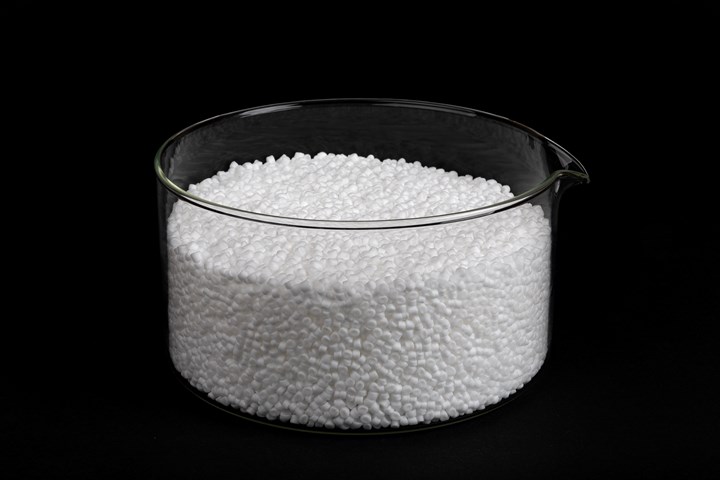Silicone-Based Additive Masterbatch for PE Molding Compounds with Recycle Content
Wacker’s new Genioplast PE50S08 masterbatch contains a non-reactive, ultra-high-molecular-weight polydimethylsiloxane as an active component.

A new additive masterbatch for enhancing the processing of PE molding compounds will be among the products highlighted by Wacker at the upcoming K 2022 exhibition. With Genioplast PE50S08, the company is expanding its portfolio of silicone-based compounding additives with a product that was specially developed for use in PE molding compounds. The pellet-form product contains a non-reactive, ultra-high-molecular-weight polydimethylsiloxane as an active component. The backing material is an LDPE, with the silicone content of the masterbatch at 50%.
Genioplast PE50S08 is said to be a highly effective processing aid. In filled formulations, the silicone active ingredient improves the distribution of the fillers and the flowability of the polymer melt. This increases the throughput at the extruder. The energy requirement for compounding is also reduced--a clear advantage for the processor. If mixtures of different types of PE are compounded, as is the case when processing recycled PE, Genioplast PE50S08 is said to provide for an even mixing process without major torque and temperature fluctuations. Polyethylene recycling is therefore one of the most important areas of application for the new additive.
All process-improving properties are also noticeable in the shaping of the compounds. With blown extrusion, manufacturers of PE films reportedly achieve significantly higher productivity. Similarly, less die deposits form during the extrusion of cable jacket formulations, hoses or profiles made of filled polyethylene. In addition, Genioplast PE50S08 has been shown to improve the surface quality of polyethylene articles. The additive reduces the coefficient of sliding friction of the plastic formulation. Its surface therefore feels silky and dry. As a result of the reduced surface friction, the articles are more scratch and abrasion resistant, which means films can be unrolled more easily. The additive also improves the impact strength of the plastic in the end use.
As a rule, Genioplast PE50S08 is used in a dosage of 1% to 3%, can be easily dosed using a standard system and easily incorporated into PE mixtures on a twin-screw extruder even if mineral fillers are added.
Other additive masterbatches to be showcased by Wacker for compounding thermoplastics are:
▪ Genioplast Pellet S: The additive is universally suitable for the compounding of all thermoplastics. As an active component, it contains an uncrosslinked, ultra-high-molecular silicone polymer, which has been applied to a highly disperse silicic acid. The main area of application is flameproof cable sheathing.
▪ Genioplast PP50S12: The silicone additive masterbatch improves the scratch resistance of polypropylene items. The most important applications are packaging films, garden furniture and components for car interiors.
▪ Genioplast Pellet 345: The silicone-based additive for thermoplastic polyurethanes gives smartphone cases, wearable bracelets and other items made of these plastics a pleasant feel and reduces their tendency to get dirty.
Related Content
-
BASF Highlighting How They 'Make, Use and Recycle Future Solutions'
NPE2024: BASF is using its proprietary computer-aided engineering tool Ultrasim when designing for sustainability in a broad range of industries.
-
Additives Boast Sustainability Without Sacrificing Performance
Sustainability continues to dominate new additives technology, but upping performance is also evident. Most of the new additives have been targeted to commodity resins and particularly polyolefins.
-
At NPE2024, Follow These Megatrends in Materials and Additives
Offerings range from recycled, biobased, biodegradable and monomaterial structures that enhance recyclability to additives that are more efficient, sustainable and safer to use.















